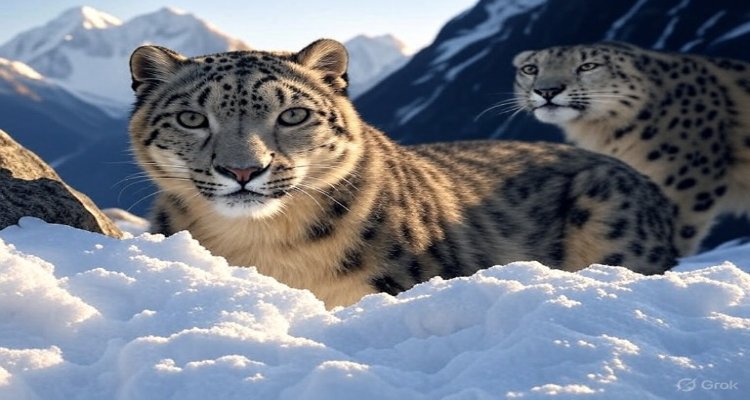Nepal Officially Joins International Big Cat Alliance

Nepal joins the International Big Cat Alliance, strengthening global collaboration in protecting tigers, snow leopards, and leopards while advancing wildlife conservation.
Introduction: A Leap Forward for Big Cat Conservation
On August 23, Nepal took a decisive step in wildlife conservation by officially joining the International Big Cat Alliance (IBCA). Home to snow leopards in its high-altitude Himalayan landscapes, tigers in dense jungles, and leopards across forested regions, Nepal’s inclusion brings both symbolic and practical weight to the global coalition dedicated to saving big cats.
This move is not just about wildlife—it is about ecological balance, climate resilience, and international solidarity in protecting endangered species that transcend borders.
Context & Background: Why Big Cats Matter
Big cats—tigers, leopards, lions, snow leopards, cheetahs, jaguars, and pumas—are apex predators that regulate ecosystems, maintain biodiversity, and serve as powerful indicators of environmental health. Yet, human expansion, habitat loss, and illegal poaching have driven most species into steep decline.
India spearheaded the International Big Cat Alliance on April 9, 2023, during an event marking 50 years of Project Tiger, one of the world’s most successful wildlife recovery initiatives. Backed by the National Tiger Conservation Authority (NTCA) and headquartered in India, the alliance serves as a treaty-based, intergovernmental platform uniting 95 countries with big cat habitats, as well as non-range nations committed to global conservation.
Nepal’s Commitment: From Tiger Recovery to Global Collaboration
Nepal’s conservation track record is already inspiring. In just over a decade, the nation achieved what many once thought impossible—nearly tripling its wild tiger population, from 121 in 2009 to 355 in 2022. This success reflects strong anti-poaching measures, community involvement, and cross-border collaboration with India.
By joining the IBCA, Nepal signals its intent to extend this success to other species, particularly the elusive snow leopard, which remains under severe threat due to climate change and shrinking habitats.
Inside the International Big Cat Alliance (IBCA)
The IBCA is more than a symbolic coalition—it is a multi-country, multi-agency platform aimed at pooling knowledge, resources, and funds to halt and reverse the decline of big cat populations.
- Launched: April 9, 2023, by Prime Minister Narendra Modi
- Legal Framework: Treaty-based intergovernmental body since January 23, 2025
- Headquarters: India
- Scope: Conservation of seven big cats—tiger, lion, leopard, snow leopard, cheetah, jaguar, puma
- Stakeholders: 95 range and non-range countries, conservation organizations, research institutes, corporate partners
- Key Goals:
- Create a central repository of knowledge and best practices
- Build a funding corpus for conservation projects
- Strengthen existing species-specific treaties
- Encourage transnational initiatives to protect big cat corridors
- Support climate adaptation strategies for fragile ecosystems
Expert Insight: Why Nepal’s Role Matters
Conservation experts view Nepal’s membership as a natural extension of its achievements.
“Nepal has shown the world that tiger conservation is possible through science-backed policies and community participation. Its role in IBCA will add Himalayan expertise in snow leopard preservation, a critical species threatened by global warming,” says Dr. Ramesh Thapa, a South Asian wildlife researcher.
Local communities also stand to benefit. By safeguarding big cats, Nepal strengthens eco-tourism—an industry vital for rural livelihoods—while ensuring environmental security.
Global and Regional Implications
Nepal’s entry into IBCA holds wide-ranging implications:
- For South Asia: Strengthens transboundary wildlife corridors with India and China, ensuring big cats can roam freely across ecosystems.
- For Climate Action: Protecting snow leopard habitats contributes to conserving Himalayan glaciers, the water source for millions across Asia.
- For Global Conservation: Adds momentum to a unified, well-funded, and scientifically informed effort to stop species decline worldwide.
Conclusion: A United Path to Protect the Wild
With Nepal officially on board, the International Big Cat Alliance gains not just another member but a success story that can inspire others. As nations confront biodiversity loss and climate challenges, IBCA’s collaborative model could become a blueprint for global conservation.
The survival of big cats is more than an environmental goal—it is a shared responsibility to protect the natural heritage that sustains life on Earth.
Disclaimer :This article is for informational purposes only. It does not represent official statements from the International Big Cat Alliance or government bodies.










